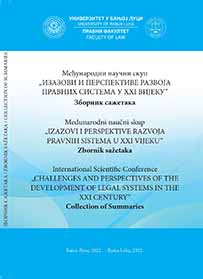REFLECTIONS ON JOHN FINNIS’S READING OF THE FOURTEENTH AMENDMENT AND THE US SUPREME COURT’S DECISION IN DOBBS V JACKSON
REFLECTIONS ON JOHN FINNIS’S READING OF THE FOURTEENTH AMENDMENT AND THE US SUPREME COURT’S DECISION IN DOBBS V JACKSON
Author(s): Igor MilinkovićSubject(s): Constitutional Law, Civil Law, Sociology of Law
Published by: Правни факултет Универзитета у Бањој Луци
Keywords: John Finnis; good of life; abortion; personhood; 14th Amendment; privacy; originalism;
Summary/Abstract: John Finnis is one of the most influential contemporary scholars in the fields of legal theory, philosophy of law, and constitutional law. He is also the author of a large number of articles devoted to relevant bioethical topics. Writing from a Catholic theological perspective, Finnis advocates a conservative position regarding a number of controversial issues in reproductive ethics, such as the problem of the justification of abortion, the moral and legal status of the embryo, and new reproductive technologies. Strong opposition to the legal admissibility of abortion prompted him to become involved in constitutional debates in the United States, where he has continuously advocated abandoning the interpretation of the 14th Amendment, as offered, among others, in the landmark US Supreme Court’s decision in Roe v Wade (1973). During the proceedings in Dobbs v Jackson Women’s Health Organization, together with Robert George (another proponent of the conservative bioethical thought and Finnis’s companion from the “new natural law” movement), Finnis argued as amicus curiae to overturn Roe v Wade. The paper will compare the arguments presented in the Amicus Brief written by these two authors, as well as Finnis’s arguments offered in earlier articles, with the Supreme Court’s argumentation in Dobbs v Jackson. The originalist character of Finnis’s reading of the 14th Amendment will be assessed, as well as the connection of the Supreme Court’s arguments stated in the Dobbs decision with the originalist method of constitutional interpretation. In conclusion, the question of how slippery the slope has been created by the Court’s denial that the right to privacy, as one of the unenumerated constitutional rights, represents the basis for the right to abortion will be explored.
Journal: Зборник радова Међународни научни скуп „Изазови и перспективе развоја правних система у XXI вијеку"
- Issue Year: 2022
- Issue No: 2
- Page Range: 43-62
- Page Count: 20
- Language: English

